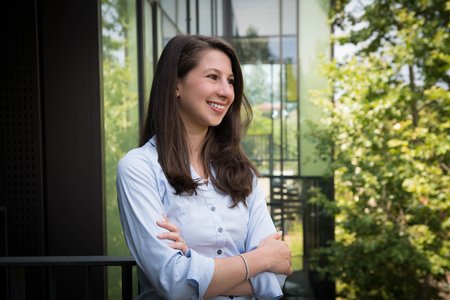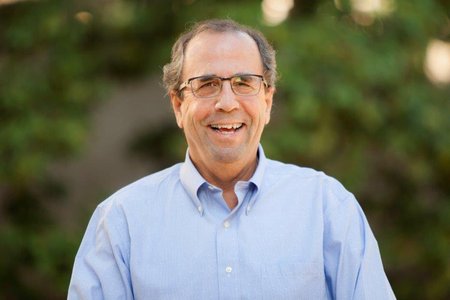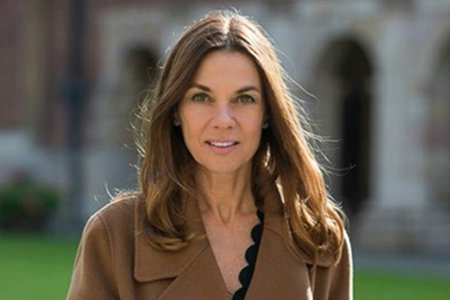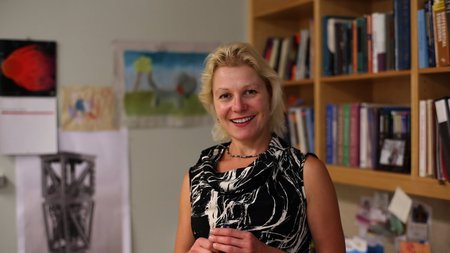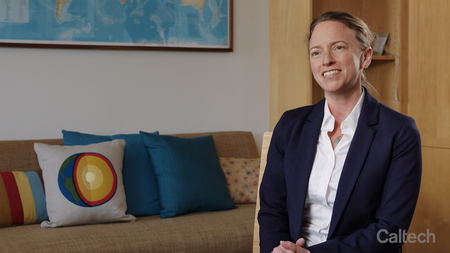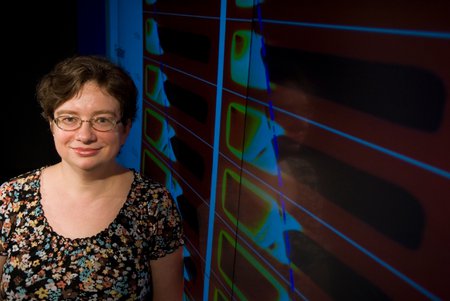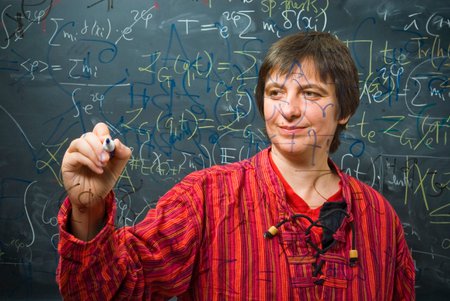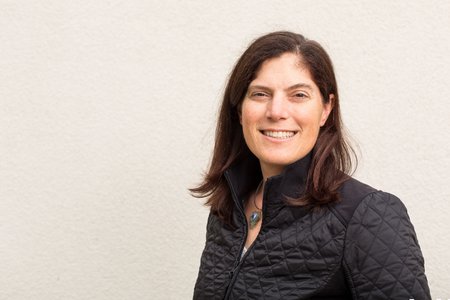Over the last year, Caltech recognized 13 faculty members with the Institute's most distinguished award for individual faculty, a named professorship, and six faculty members with leadership chairs. These honors provide faculty with additional resources to pursue their ideas while they continue to mentor future generations.
Each named professorship brings its own distinct legacy. Many professorships, for instance, have long-standing histories and pass a tradition of discovery and exploration from one academic generation to the next, from one colleague to another. A professorship may also provide a faculty member with an opportunity to forge meaningful connections with the philanthropists who made the award possible.
A leadership chair generates discretionary funds that enable academic leaders to support innovative research projects with potential for scientific and societal impact and to support Caltech's educational mission and outreach programs.
Caltech is pleased to present its newest cohort of named professors and leadership chairs.
Katherine L. (Katie) Bouman
Assistant Professor of Computing and Mathematical Sciences, Electrical Engineering, and Astronomy
Rosenberg Scholar
Division of Engineering and Applied Science
Katie Bouman's research focuses on computational imaging. By combining ideas from signal processing, computer vision, machine learning, and physics, she designs systems that integrate algorithms and sensors to observe phenomena that were difficult or impossible to measure with traditional approaches. As part of the Event Horizon Telescope team, Bouman helped to create a computational Earth-sized telescope that took the first-ever images of a black hole in 2019.
She joined the Caltech faculty in 2019.
John Dabiri (MS '03, PhD '05)
Centennial Professor of Aeronautics and Mechanical Engineering
Division of Engineering and Applied Science
John Dabiri works on unsteady fluid mechanics and flow physics, in particular as they relate to biology, energy, and the environment. His study of the movement of schools of fish led to new insights into the design of wind farms; recently, he developed implants that modulate the motion of jellyfish, causing them to swim faster and more efficiently.
He was on the Caltech faculty from 2005–15 and rejoined the faculty in 2019.
Dennis Dougherty
George Grant Hoag Professor of Chemistry
Norman Davidson Leadership Chair
Division of Chemistry and Chemical Engineering
Dennis Dougherty's research applies the tools of chemistry to biological problems, such as how drugs like nicotine bind to receptors in our brains. In particular, he is focused on the chemistry of neuroscience. His group uses a variety of chemical methods to study the function of ion channels and neuroreceptors. Drugs that interact with these structures aim to treat disorders like Parkinson's disease, schizophrenia, and learning and attention deficits.
He joined the Caltech faculty in 1979.
Manuel Endres
Assistant Professor of Physics
Rosenberg Scholar
Division of Physics, Mathematics and Astronomy
Manuel Endres conducts experiments and theoretical research in quantum science. His group is developing techniques for controlling single atoms with optical "tweezers," work that has led to an atomic "tweezer clock" that holds promise to be the most accurate and precise yet and with applications in quantum computers. Endres is working on creating many-body entanglement in the lab, in which multiple atoms are entangled and can be controlled for future quantum technologies.
He joined the Caltech faculty in 2016.
Mordecai Feingold
Kate Van Nuys Page Professor of the History of Science and the Humanities
Division of the Humanities and Social Sciences
A historian of science, Mordechai Feingold researches periods from the Renaissance to the 18th century. He focuses on how the rise of modern science transformed Western culture from a humanistic, religious, and unified culture during the 16th century into a scientific, technological, secular, and fragmented one by the 19th century. Feingold has authored four monographs, including Newton and the Origin of Civilization (2012).
He joined the Caltech faculty in 2002.
Kevin Gilmartin
William R. Kenan, Jr., Professor of English
Vice President for Student Affairs
Allen V. C. Davis and Lenabelle Davis Leadership Chair of Student Affairs
Division of the Humanities and Social Sciences
Kevin Gilmartin is an expert on social and political developments in British literature and print culture during the Age of Revolution, an era of social and political upheaval in Europe and the Americas from the late 18th century through the first half of the 19th century. He currently studies shifting representations of rural poverty. Gilmartin served as dean of undergraduate students from 2016–20.
He joined the Caltech faculty in 1991, and was appointed vice president for student affairs in 2020.
Magdalena Zernicka-Goetz
Bren Professor of Biology and Biological Engineering
Division of Biology and Biological Engineering
Magdalena Zernicka-Goetz studies the processes that start and guide embryonic development, attempting to understand what happens during the first few weeks of human life after an egg is fertilized. Recently, she and her group discovered how very young embryos conduct quality control on the cellular level to guarantee the health of the whole embryo, and how an embryo ensures it can grow at the right time. She also creates embryos from stem cells. She is an affiliated faculty member of the Tianqiao and Chrissy Chen Institute for Neuroscience at Caltech and of the Beckman Institute.
She joined the Caltech faculty in 2019.
Julia R. Greer
Ruben F. and Donna Mettler Professor of Materials Science, Mechanics and Medical Engineering
Fletcher Jones Foundation Director of the Kavli Nanoscience Institute
Division of Engineering and Applied Science
Julia Greer is a pioneer of "nanoarchitected materials" that are created using additive manufacturing, geometrical design, and chemical synthesis. Such "meta-materials" do not exist in nature but rather are created through engineering multi-scale microstructural hierarchies. The applications of her research span chemical and biological devices; ultralightweight energy-storage systems like batteries; durable, damage-tolerant fabrics; additive manufacturing; and smart, multifunctional materials.
She joined the Caltech faculty in 2007.
Julia Kornfield (BS '83)
Elizabeth W. Gilloon Professor of Chemical Engineering
Division of Chemistry and Chemical Engineering
Julia Kornfield (BS '83) studies how the molecular structures of polymers create their macroscopic properties. Her research has applications in the development of synthetic fibers, plastics, elastomers, adhesives, and coatings, and in the treatment of eye diseases such as macular degeneration and diabetic retinopathy. She has also created an additive for jet fuel that lessens the chance of explosions during accidents or terrorist attacks.
She joined the Caltech faculty in 1990.
Jennifer Jackson
William E. Leonhard Professor of Mineral Physics
Division of Geological and Planetary Sciences
Jennifer Jackson's expertise is on the mineralogy of Earth's deep interior. She explores the multifaceted roles that dense oxides, silicates, and iron alloys play in shaping the diverse landscapes at the interface between Earth's mantle and core. Jackson and her group reproduce the required extreme conditions of pressure and temperature with diamond anvil cells and infrared lasers and have developed novel experiments for material characterization. Recently, she began collaborating with JPL on methods to detect "Venusquakes" from a balloon-based platform in Venus' atmosphere.
She joined the Caltech faculty in 2007.
Nadia Lapusta
Lawrence A. Hanson, Jr. Professor of Mechanical Engineering and Geophysics
Division of Geological and Planetary Sciences
Nadia Lapusta combines analytical and numerical modeling with experimental findings to study friction and fracture phenomena. She explores how microscale behavior in brittle materials like rocks governs large-scale earthquake ruptures, and what can be learned about upcoming large earthquakes by integrating lab studies with information about unperceivable fault motions and microseismicity. Other work examines the failure of geomaterials in the presence of fluids, with applications to hydrothermal energy extraction and carbon dioxide sequestration.
She joined the Caltech faculty in 2002.
Matilde Marcolli
Robert F. Christy Professor of Mathematics and Computing and Mathematical Sciences
Division of Engineering and Applied Science
Matilde Marcolli's research spans the interface between mathematics and theoretical physics. In mathematics, she has studied low-dimensional topology, non-commutative geometry, and algebraic and arithmetic geometry. Her physics work focuses on quantum field theory, quantum statistical mechanics, geometric models for cosmology and particle physics, and quantum Hall systems. Recently she has applied geometry and statistical physics to coding theory and to mathematical and computational linguistics. She also studies the geometric aspects of quantum information and geometric models for neuroscience.
She joined the Caltech faculty in 2008.
Dean Mobbs
Professor of Cognitive Neuroscience
Chen Scholar
Division of the Humanities and Social Sciences
Dean Mobbs employs brain imaging, computational modeling, and behavioral techniques to study neurobiological systems responsible for fear and anxiety, how people control their fears, and how anxiety and psychiatric disorders disrupt those processes. Using a video game to simulate a virtual predator, he found people prone to anxiety were quicker to flee danger. He is also examining responses to the coronavirus pandemic. Mobbs is an affiliated faculty member of the Tianqiao and Chrissy Chen Institute for Neuroscience at Caltech.
He joined the Caltech faculty in 2016.
Richard Murray
Thomas E. and Doris Everhart Professor of Control and Dynamical Systems and Bioengineering
William K. Bowes Jr. Leadership Chair of the Division of Biology and Biological Engineering
Division of Biology and Biological Engineering
Richard Murray's research focuses on the application of feedback and control to networked systems, with applications in biology and autonomy. His projects include work on synthetic biology, in which biological molecules and mechanisms are engineered to produce materials, manipulate their environment, and construct bimolecular machines; the design of novel, highly resilient architectures for autonomous systems such as self-driving cars and autonomous aircraft; and networked control systems. He served as the chair of the Division of Engineering and Applied Science from 2000–05 and as director of Information Science and Technology from 2006–09.
He joined the Caltech faculty in 1991.
Victoria Orphan
James Irvine Professor of Environmental Science and Geobiology
Allen V. C. Davis and Lenabelle Davis Leadership Chair of the Center for Environmental Microbial Interactions
Division of Geological and Planetary Sciences
James Irvine Professor of Environmental Science and Geobiology and Allen V. C. Davis and Lenabelle Davis Leadership Chair of the Center for Environmental Microbial Interactions
Victoria Orphan studies the ecology of anaerobic microbial communities that are involved in carbon, nitrogen, and sulfur cycling in ocean ecosystems. She uses single-cell isotopic imaging and molecular techniques to investigate metabolic symbiosis that involves uncultured microorganisms found in deep-sea methane and hydrothermal vents, and deep subsurface environments. Orphan recently had a newly discovered hydrothermal vent polychaete (a scale worm) named in her honor.
She joined the Caltech faculty in 2004.
Sarah Reisman
Bren Professor of Chemistry
Division of Chemistry and Chemical Engineering
Sarah Reisman and her research group seek to advance the science of chemical synthesis, through synergistic contributions in both reaction development and design concepts for the synthesis of complex molecules. Reisman is recognized as a leader in the area of natural product synthesis; her group has devised innovative syntheses of molecules with potential applications in medicine and for agrochemical development.
She joined the Caltech faculty in 2008.
Shu-ou Shan
Altair Professor of Chemistry
Executive Officer for Biochemistry and Molecular Biophysics
Division of Chemistry and Chemical Engineering
Shu-ou Shan conducts research that bridges the gap between chemistry and biology to understand biological processes at a quantitative and molecular level. Her work focuses on the first few moments of a protein's life, when it is folded into the complex three-dimensional shape that allows it to function as intended, and examines the inner workings of the macromolecular machines in the cell that make, sort, and organize these proteins.
She joined the Caltech faculty in 2005.
Barbara J. Wold
Bren Professor of Molecular Biology
Allen V. C. Davis and Lenabelle Davis Leadership Chair of the Richard N. Merkin Institute for Translational Research
Division of Biology and Biological Engineering
Barbara Wold examines how gene activity is encoded in the DNA and develops the technologies needed to figure that out. Her research group uses genomics to understand the basis of cellular identity, how it is disrupted in disease, and how it can be engineered. Wold was the director of the Beckman Institute at Caltech from 2001–11; in 2012, she founded the National Cancer Institute's Center for Cancer Genomics.
She joined the Caltech faculty in 1981.




